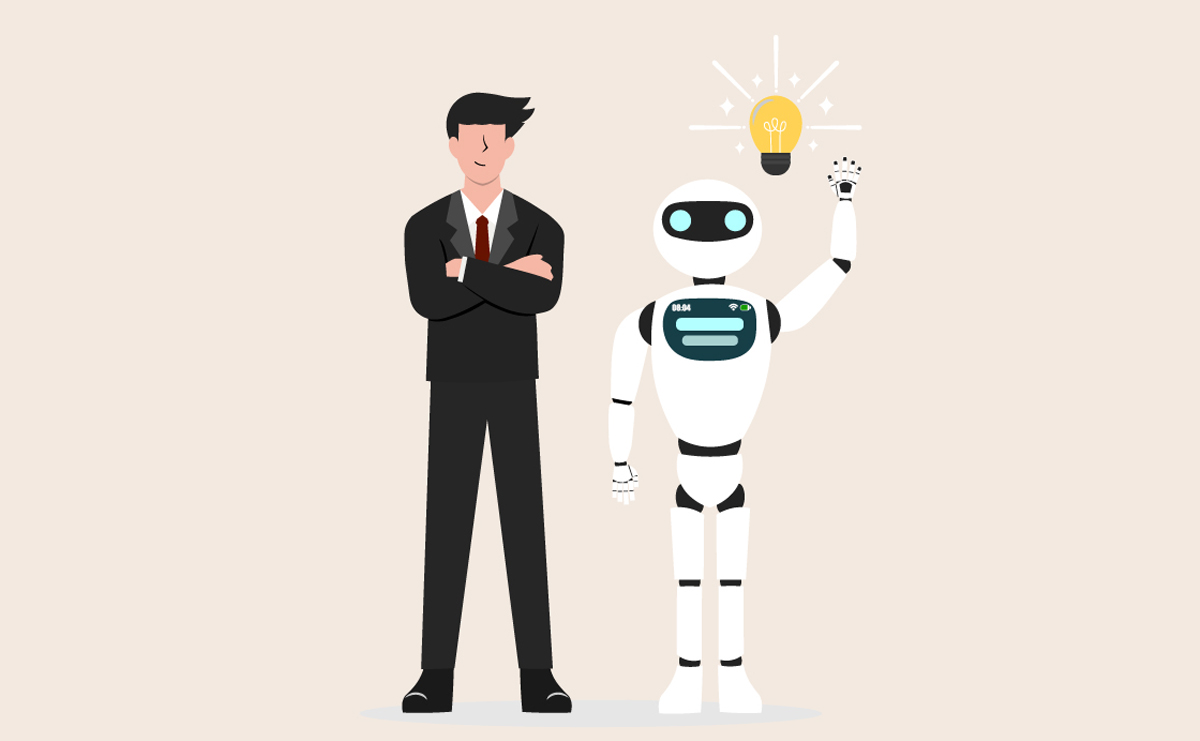Contents
Revolutionizing Legal Support: Will AI Replace Paralegals?
The legal industry like many other industry fields is now reshaping because of the emergence of upcoming technologies such as AI. For instance, AI paralegal will be a new tool for law firms to use in order to manage their cases. In this blog, we have discussed the main question of “Will AI replace paralegals?” along with checking the possibilities.
Understanding the Role of Paralegals and Legal Assistants
I. Key Responsibilities of Paralegals
Paralegals are critical in supporting attorneys by managing essential yet time-intensive tasks. These responsibilities include conducting legal research, drafting legal documents, maintaining case files, and ensuring compliance with court deadlines. Paralegals often act as the organizational backbone of law firms, streamlining case preparation and administrative duties. Their work requires an in-depth understanding of legal terminology, procedures, and documentation standards. By handling these responsibilities effectively, paralegals allow attorneys to focus on strategic aspects of case management and client representation.
II. Skills and Expertise Required in Legal Support Roles
The role of a paralegal demands a unique combination of technical knowledge and interpersonal skills. Proficiency in legal research tools, attention to detail, and the ability to draft accurate and precise documents are fundamental. Additionally, strong organizational abilities and practical communication skills are essential for liaising with clients, attorneys, and court officials. As paralegal AI tools become more prevalent, professionals in this field are also expected to adapt by gaining technological proficiency, enabling them to leverage AI solutions for greater efficiency. This blend of traditional legal expertise and technological adaptability ensures the ongoing relevance of human paralegals in the evolving legal landscape.

III. Human-Centric Aspects of Paralegal Work
While technology advances, certain aspects of paralegal work remain inherently human. Paralegals often navigate complex client interactions, requiring empathy and the ability to build trust—qualities that AI paralegal systems cannot fully replicate. Moreover, their role frequently involves nuanced judgment in analyzing legal scenarios and ensuring ethical compliance, which relies on a deep understanding of context and intent. These human-centric aspects highlight the limitations of technology and answer the question, “Will AI replace paralegals?” with a nuanced perspective: while AI can enhance efficiency, it cannot entirely supplant the critical human elements of paralegal work.
Understanding the multifaceted nature of paralegal responsibilities and skills makes it evident why these roles are indispensable. As technology like paralegal AI continues to evolve, its optimal use will be as a complementary tool, augmenting human expertise rather than replacing it.
How AI is Impacting Paralegal Work
I. Automation of Routine Tasks
AI paralegal systems are transforming the way routine administrative tasks are handled within legal firms. Activities such as organizing case files, scheduling deadlines, and managing document templates are now streamlined through automation. These tools significantly reduce the time spent on repetitive and mundane tasks, allowing paralegals to focus on more complex responsibilities. Automation also minimizes the risk of human error in tasks like data entry and document formatting, enhancing overall accuracy and efficiency in legal operations. Adopting automation demonstrates how AI reshapes paralegal workflows, improving productivity across legal teams.
II. Enhancing Research and Document Review
Legal research and document review are cornerstone responsibilities for paralegals, and advancements in paralegal AI are revolutionizing these areas. AI systems can rapidly analyze vast volumes of legal precedents, statutes, and case law, delivering relevant insights within seconds. Similarly, these tools excel at identifying inconsistencies or critical clauses in contracts and legal documents, tasks that traditionally require hours of manual effort. By augmenting the research and review process, AI enables paralegals to deliver faster and more precise results. This capability underscores the value of integrating AI into legal support roles while retaining human oversight for nuanced interpretation.
III. Speeding Up Client Intake and Communication
AI technologies are also transforming client-facing tasks such as intake and communication. AI-driven chatbots and virtual assistants streamline the initial client intake process by gathering essential information and pre-screening cases for relevance and viability. These tools enhance responsiveness, ensuring that clients receive prompt and accurate assistance. While AI cannot replace the empathetic touch of human interaction, it serves as an effective complement by handling routine queries and follow-ups efficiently. However, “Will AI replace paralegals?” must be considered critically. Although AI improves the speed and accessibility of client interactions, it cannot replicate the trust and understanding that human paralegals bring to these relationships.
In summary, AI is undeniably reshaping the scope of paralegal work by automating repetitive tasks, expediting research, and improving client communication. Despite these advancements, human judgment and expertise remain indispensable for ensuring ethical and practical legal support. Paralegal AI is best seen as a tool for enhancing, rather than replacing, the critical contributions of human professionals in the legal field.
Will AI Replace Paralegals Completely?
I. Areas Where AI Falls Short
While AI paralegal tools offer remarkable advancements in efficiency and accuracy, they are not without limitations. AI systems are inherently dependent on data and algorithms, which can fail to account for the complexities and subtleties of legal matters. For example, AI struggles to understand contextual nuances, cultural implications, or moral considerations that often influence legal decision-making. In addition, AI tools may misinterpret ambiguous language in legal documents or fail to identify potential ethical dilemmas. These limitations highlight why a fully automated replacement of paralegals is unlikely, as human expertise is essential to address the intricacies of legal work.
II. Importance of Human Judgment in Legal Work
Paralegals play a critical role in applying human judgment to their tasks, which remains irreplaceable despite technological advancements. Situations requiring ethical decision-making, prioritization of conflicting deadlines, or interpreting client emotions depend on qualities unique to human professionals. Legal work often involves gray areas where strict adherence to data-driven rules is insufficient. This reliance on human judgment answers the pressing question, “Will AI replace paralegals?” with a clear understanding that AI serves as a powerful assistant but cannot emulate human reasoning, empathy, or ethical discernment.
III. The Evolving Role of AI and Human Paralegals
Rather than viewing AI as a competitor to paralegal roles, seeing it as a transformative collaborator is more accurate. Paralegal AI systems are designed to enhance the capabilities of legal support teams by handling routine and high-volume tasks. This partnership allows paralegals to focus on higher-value activities such as client engagement, strategic planning, and case analysis. By shifting their focus to more complex responsibilities, paralegals can contribute more meaningfully to the success of their firms. This evolving dynamic underscores that AI is not a replacement but an enabler of human excellence in the legal field.
Advantages of Integrating AI with Paralegal Work
I. Boosting Efficiency and Productivity
Integrating AI paralegal tools has revolutionized the efficiency of legal support teams. These systems automate time-intensive tasks such as document management, research, and calendaring, freeing up paralegals to focus on higher-value responsibilities. By streamlining workflows, AI reduces the time required for routine operations and enhances overall productivity. Legal teams can manage higher caseloads without compromising quality, ensuring better client outcomes. The ability to handle repetitive tasks quickly and accurately demonstrates the value of incorporating AI into paralegal workflows, making legal support teams more effective and responsive.
II. Reducing Errors in Documentation
Legal documentation requires impeccable accuracy, as even minor errors can have significant consequences. Paralegal AI systems excel in this area by performing tasks like proofreading, cross-referencing, and data entry with precision. These tools reduce the likelihood of errors in contracts, briefs, and filings, ensuring compliance with legal standards. Additionally, AI can flag inconsistencies or omissions that may go unnoticed during manual review. While human oversight remains critical, leveraging AI significantly lowers the risk of costly mistakes, thereby increasing the reliability of legal documentation.
III. Allowing Paralegals to Focus on Higher-Value Tasks
One of the most significant advantages of integrating AI into paralegal work is the shift it enables toward more strategic responsibilities. By automating repetitive tasks, AI allows paralegals to dedicate their time and expertise to activities such as client engagement, complex case analysis, and supporting attorneys in litigation strategy. This transformation enhances paralegals’ job satisfaction and improves the quality of legal services they deliver to clients. The question “Will AI replace paralegals?” finds a clear answer: rather than replacing these professionals, AI elevates their role by enabling them to contribute meaningfully to their teams and clients.
Adopting AI paralegal technology provides substantial benefits, including increased efficiency, reduced errors, and opportunities for paralegals to focus on impactful tasks. These advantages illustrate how AI enhances, rather than diminishes, the value of human expertise in the legal profession. By integrating AI effectively, law firms can achieve tremendous success while maintaining the essential contributions of their paralegal staff.
Challenges of Relying on AI for Legal Support
I. Ethical and Privacy Concerns
Implementing AI paralegal systems raises significant ethical and privacy concerns within the legal industry. These systems process large amounts of sensitive client information, making data security and confidentiality critical issues. Breaches or misuse of such data could have severe consequences for clients and legal professionals. Furthermore, using AI in decision-making processes could lead to ethical dilemmas if biases embedded in algorithms influence outcomes. Addressing these concerns requires robust data protection measures, strict compliance with privacy regulations, and regular audits to ensure the ethical use of AI tools.
II. Limitations in Understanding Legal Nuances
Despite the advanced capabilities of paralegal AI, it remains limited in its ability to understand the nuances and complexities of legal work. Legal matters often involve intricate interpretations of laws, precedents, and contractual language that require human expertise. AI tools may struggle to analyze ambiguous clauses, recognize subtleties in case law, or account for cultural and contextual factors that impact legal strategies. These limitations highlight why AI cannot wholly replace human paralegals and answer the question, “Will AI replace paralegals?” clearly acknowledging the indispensable role of human judgment in navigating complex legal scenarios.
III. Costs and Implementation Barriers
Adopting AI technology in legal support also presents financial and logistical challenges. Advanced AI systems require significant upfront software, hardware, and training investment. Smaller law firms or solo practitioners may find these costs prohibitive, creating disparities in access to cutting-edge legal technologies. Additionally, integrating AI into existing workflows often involves a steep learning curve, as legal professionals must adapt to new tools and processes. These barriers may delay the widespread adoption of AI in the legal field, emphasizing the importance of scalable and user-friendly solutions that benefit firms of all sizes.
In conclusion, while AI paralegal systems offer immense potential to improve efficiency and accuracy, their adoption is accompanied by notable challenges. Ethical and privacy concerns, limitations in understanding legal nuances, and cost-related barriers must be addressed to ensure AI’s responsible and effective use in legal support. By approaching these challenges proactively, the legal industry can harness AI’s benefits without compromising human paralegals’ essential contributions.
Future Outlook: Collaboration Between AI and Paralegals
I. Skills Paralegals Should Develop to Stay Relevant
As AI technology evolves, paralegals must enhance their skill sets to remain competitive in the legal field. Familiarity with AI paralegal tools and legal technology platforms is increasingly essential. Paralegals should focus on developing technical skills such as data management, proficiency in legal software, and a basic understanding of AI-driven analytics. Additionally, emphasizing interpersonal and critical thinking skills will ensure they can manage tasks requiring empathy and judgment, which AI cannot replicate. By embracing both technological and traditional competencies, paralegals can secure their place in the future of legal support.
II. AI as a Partner, Not a Replacement
Rather than viewing AI as a threat, legal professionals should recognize its potential as a collaborative tool. Paralegal AI systems excel in handling repetitive and high-volume tasks, allowing human professionals to focus on strategic, creative, and client-centered activities. This collaboration fosters a dynamic where AI enhances the capabilities of paralegals rather than diminishing their roles. The question “Will AI replace paralegals?” finds a balanced answer here: AI will not eliminate paralegals but will redefine their roles to emphasize higher-value contributions. This partnership can drive innovation and efficiency across the legal industry.
III. Predicting the Evolving Role of Paralegals
Integrating AI into legal workflows is shaping a new future for paralegal work. Paralegals will likely take on more advisory and analytical roles, supporting attorneys with deeper insights and strategic input. As AI systems handle administrative and research-intensive tasks, paralegals will have more opportunities to engage with clients, manage complex cases, and ensure compliance with evolving regulations. This transformation positions paralegals as indispensable members of legal teams, working alongside AI to deliver comprehensive and efficient legal services.
In conclusion, the future of paralegal work lies in collaboration, where AI is a powerful ally in enhancing productivity and precision. By adapting to technological advancements, paralegals can thrive in an evolving legal landscape, combining the strengths of human judgment with the efficiency of AI paralegal systems. The legal profession benefits significantly from this partnership, ensuring that AI and human expertise deliver superior legal support.
The Future of Legal Support: Human Expertise and AI in Harmony
The rise of AI paralegal technology marks a transformative era in the legal industry, enhancing efficiency, accuracy, and productivity. These tools streamline routine tasks, accelerate legal research, and optimize client communication, empowering paralegals to focus on higher-value activities. However, the answer to “Will AI replace paralegals?” lies not in displacement but in collaboration. AI complements, rather than replaces, the critical thinking, empathy, and ethical judgment that human paralegals bring to the profession. AI and human expertise create a robust partnership that delivers superior legal support.
As the legal landscape evolves, the role of paralegal AI will continue to grow, requiring legal professionals to adapt and expand their skill sets. Paralegals can remain indispensable in a tech-driven world by embracing technology and honing interpersonal and analytical abilities. This synergy between human expertise and AI ensures a future where legal teams operate at peak efficiency while preserving the nuanced, client-centered approach that defines exceptional legal service. Integrating AI into paralegal work is not the end of the profession but a redefinition that promises to elevate its value and impact.
Empower Your Legal Practice with RunSensible
Elevate your law firm’s efficiency and client service with RunSensible, the all-in-one solution to streamline legal operations. From robust case management and automated calendaring to seamless client intake and document automation, RunSensible equips your team with the tools to work smarter, not harder. Its intuitive platform integrates advanced features like e-signatures and communication tracking, ensuring you stay organized and ahead of deadlines.
Whether managing a growing practice or refining your workflow, RunSensible adapts to your needs, helping you save time, reduce errors, and focus on what matters most—delivering exceptional legal support. Discover how RunSensible can transform your practice and take the first step toward more competent legal management today!
FAQs
1. How is AI currently used in the legal industry?
AI is widely used in the legal industry for document review, legal research, contract analysis, and client intake tasks. AI systems help identify relevant case law, streamline repetitive tasks, and enhance accuracy in drafting documents. These tools improve efficiency and allow legal professionals to focus on higher-value activities.
2. Will AI completely replace human legal professionals?
AI is unlikely to replace human legal professionals completely. While it excels at automating repetitive tasks and analyzing large datasets, AI cannot interpret complex legal nuances, exercise ethical judgment, and provide empathetic client interactions. Human expertise remains essential for strategic decision-making and understanding the unique context of legal matters.
3. What ethical challenges does AI pose in legal work?
AI poses ethical challenges, such as data privacy concerns, algorithm biases, and the potential for misuse in decision-making. Legal professionals must ensure that AI systems are transparent, secure, and comply with ethical standards to avoid compromising client trust or the fairness of legal outcomes.
4. What skills should legal professionals develop to work effectively with AI?
Legal professionals should focus on developing technical proficiency in AI tools, understanding how these systems work, and identifying their limitations. Critical thinking, adaptability, and interpersonal skills are vital for tasks that require human judgment and client interaction. A balance of technical and traditional skills ensures continued relevance in the evolving legal field.
Disclaimer: The content provided on this blog is for informational purposes only and does not constitute legal, financial, or professional advice.







